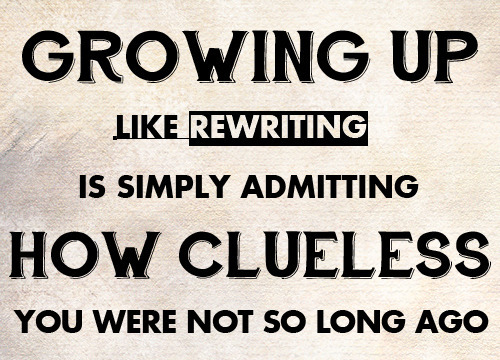Scott Westerfeld: On Rewriting & Growing Up

The “Now What?” Months are here! In 2014, we’ll be bringing you advice from authors who published their NaNo-novels, editors, agents, and more to help you polish November’s first draft until it gleams. Today, Scott Westerfeld delivers some wisdom with his pep:
At the end of drafting a novel, I’m usually in need of a laugh, so I return to the very first pages I wrote. It’s like looking at photos of myself twenty years ago: How callow I was then, how artless and unkempt, how innocent of what was to come. But what I’ve gained since those early days isn’t so much knowledge or wisdom or a better haircut, but simple perspective. I can see now where things were headed then.
Sadly, when looking at old pictures, you can’t go back and give yourself advice, or change those unfortunate clothing choices. But with first drafts you can. In that moment before revising begins, you’re no longer embedded in the hurly burly of what-happens-next and what’s-this-character’s-motivation. You have perspective.
So here’s a radical thought: revision is the perfect opportunity for outlining. Or perhaps we should call it “re-outlining” your novel, or simply “stepping back.”
I know, it’s tempting to start writing again, to fix those broken sentences in chapter twelve, or that forced dialogue right before the climax. You probably have a list. But set that list aside for a moment and make yourself a map: a big-picture view of how the pieces of your novel fit together.
You may already have an outline. Put that aside, too, and look at what you wound up actually writing. A complete draft has its own logic, and deserves some respect just for having a beginning, a middle, and an end. (If it doesn’t, maybe you’re still drafting.) Clear away those youthful hopes and dreams that linger in your original outline. And, like an older version of yourself, look back at where you went wrong.
I’ll admit I’m stuck on this younger-self metaphor, because my next novel is about both revising and growing up. It’s the story of a young novelist who spends her first year away from home rewriting a NaNoWriMo draft, which has already sold to a publisher. Facing her first draft (written in high school) is a bit like facing her younger self. It’s so enthusiastic, but so painfully innocent, and all kinds of embarrassing. Because a lot of growing up—like a lot of rewriting—is simply admitting how clueless you were not so long ago. (Which is why some people never rewrite, and why some never grow up.)
So start your revision by answering these questions:
Which scenes flowed from your pen, and which were clunky?
Which writerly decisions embarrass you now?
Which characters were like a bad relationship, and which turned out unexpectedly compelling?
Which goals that you started with aren’t worth pursuing anymore?
And what startling new vistas opened up?
In other words, what do you know now that you didn’t know then?
Realize how little you knew when you started, appreciate how much smarter you’ve become, and accept what innocence you’ve lost. Then make decisions accordingly, even if that means throwing away the obsessions of your younger self.
To throw one more analogy at you: A novel is like a cloud. When you’re in the thick of it, its shape is unknowable. But once you’ve passed through and gained a little distance, it’s much easier to see.
Make sure you take a picture before you dive back in.

Scott Westerfeld’s teen novels include the Uglies series, the Midnighters trilogy, The Last Days, an ALA Best Book for Young Adults and the sequel to Peeps. Scott was born in Texas, and alternates summers between Sydney, Australia, and New York City.
Chris Baty's Blog
- Chris Baty's profile
- 63 followers



